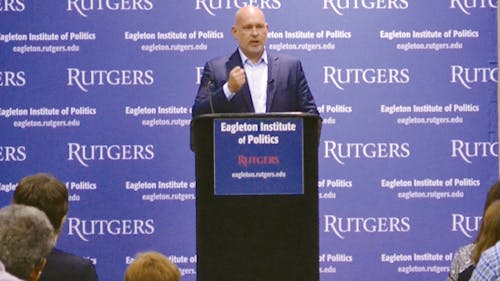Strategist shares views on future of Republican Party

Despite his success as a Republican campaign strategist, Steve Schmidt did not get into Rutgers University, said Ruth Mandel, director of the Eagleton Institute of Politics.
“I don’t know if he wants me to say this or if he was going to say this, but I learned it this afternoon, much to my chagrin, which is that his success did not include being accepted into Rutgers University,” she said.
Schmidt spoke yesterday in Trayes Hall at the Douglass Student Center. The former top strategist to President George W. Bush offered his personal insight on the future of the Republican Party. Schmidt, a New Jersey native, has also served as a senior advisor to John McCain’s presidential bid.
“Conservatism is a serious governing philosophy, and it has served its country well over its history. It is not a cult of personality,” he said.
The Eagleton Institute of Politics invites many speakers to Rutgers each year as a part of their mission to link the study and practice of politics, said Kathy Kleeman, senior communications officer for Eagleton.
The institute aims to offer a mix of viewpoints across the political spectrum, so Kleeman said they were excited to feature Schmidt.
“People are familiar with him from his frequent appearances on MSNBC and elsewhere on TV, and he’s widely regarded as one of the most thoughtful voices commenting on politics today,” she said.
Schmidt said the country is at an interesting moment in American politics, but he first talked about the history of the Republican Party to explain some of the current dynamics taking place.
The Republican Party was founded in 1854, he said. It began as an abolitionist party that fought and discouraged slavery. By 1858, republicans were the majority party in the northern and western states.
After the Civil War, one of the bloodiest in American history, the country came back together and the black community became the most reliable constituency of the Republican Party until Franklin D. Roosevelt was elected president, Schmidt said.
During the Civil War’s Reconstruction period, the Republican Party remained dominant for an extensive period of time, he said. Only a few Democrats, such as James Garfield and Grover Cleveland, interrupted this period up until Roosevelt became president.
At this point, Schmidt said members of the black community moved to the Democratic Party. The political coalition of the country fundamentally changed due to the result of the Great Depression, the New Deal and World War II.
The Civil Rights Act of 1964 resulted in a tension between the southern senators. Lyndon B. Johnson was a majority leader in the Senate and led the Democratic Party, which set up Richard Nixon’s 1968 campaign.
“So how is it that the Republican Party today stands as the country’s southern party,” Schmidt said. “A country founded in the north and in the west.”
In 1968, Nixon observed the disaffected white voters, which began the 20-year transition of the Republican Party becoming competitive in the south, he said. The transition was complete by 1988 with George H.W. Bush, who got 59.5 percent of the white vote.
The only other president to get higher than 59 percent of the white vote was Ronald Reagan, with 64 percent, Schmidt said.
Mitt Romney was the next Republican candidate to get 59.5 percent of the white vote in 2012.
“Look at the difference between what 59 percent of the white vote [yields] in 1988 versus what 59.5 percent of the white vote yields in 2012,” he said. “The Republican Party has a fundamental demographics problem.”
To win elections, he said the Republican Party has to grow roots in the north and the west again. Parag Shende, a School of Arts and Sciences senior, said although he is a Democrat, he came to the event because he has real interest in the fate of the Republican Party.
It is important considering how the Republican Party has suffered in the last two presidential elections and lost the popular vote in five out of the last six presidential elections, he said.



